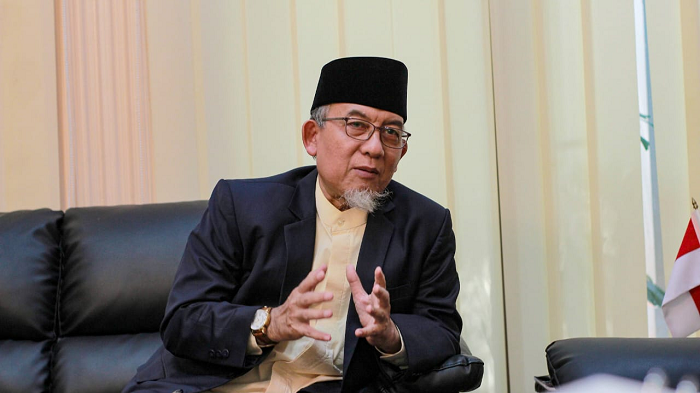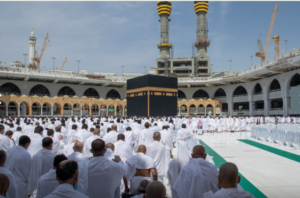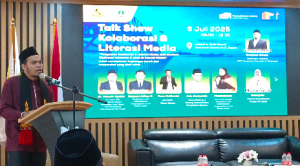Allah Subhanahu wa Ta’ala says:
مَنْ عَمِلَ صَالِحًا مِنْ ذَكَرٍ أَوْ أُنْثَىٰ وَهُوَ مُؤْمِنٌ فَلَنُحْيِيَنَّهُ حَيَاةً طَيِّبَةً ۖ وَلَنَجْزِيَنَّهُمْ أَجْرَهُمْ بِأَحْسَنِ مَا كَانُوا يَعْمَلُونَ (النحل [١٦]: ٩٧)
“Whoever does righteous deeds, both male and female, while believing, We will indeed give him a good life and indeed We will reward them with a better reward than what they did.” (Surah an-Nahl [16]: 97).
Ibn Kathir in his commentary explains that what is meant by righteous deeds is actions that are in accordance with the teachings of the Qur’an and the sunnah of the Prophet Muhammad (PBUH). With humans carrying out pious deeds that are their obligations, then Allah Subhanahu wa Ta’ala will definitely give a reward (reward) in the form of a good life, namely ease and blessing in this world and in the hereafter will receive immeasurable rewards in the form of heaven.
Also Read: Fryday Sermon: Hijrah in the Struggle for the Liberation of Al-Aqsa and Palestine
The words of Allah Subhanahu wa Ta’ala above clearly describe that Islam is a teaching that prioritizes the implementation and fulfillment of obligations. After the obligation is fulfilled, then a person receives and gets his rights in return for his deeds.
Islam does not teach its adherents to demand rights from Allah Subhanahu wa Ta’ala first before he fulfills his obligations. Because everyone who carries out his obligations, sooner or later, either directly or indirectly, surely Allah Subhanahu wa Ta’ala will fulfill his rights.
Human Rights in Islam
Several verses of the Qur’an discuss Human Rights, such as in QS Al-Ma’idah [5]: 32, which discusses the right to life, then in QS Adz-Dzariyat [51]: 19, which discusses the right to life, to obtain the necessities of life and economic rights. Equality of rights and position before the law is contained in Q.S An-Nisa [4]: 1, and there are many other verses that discuss human rights.
Also Read: Sadaqah, A Simple Act with Extraordinary Virtues: Dr. Wahyudi KS
The Muslim scholar Prof. Dr. Mukti Ali, in her book entitled “Beberapa Persoalan Agama Dewasa Ini” says that Islam is very compatible with human nature and nature to maintain its existence. This is because Islam highly upholds, guarantees and protects human rights.
Islam also teaches a balance between individual and social interests. However, in fulfilling individual rights, there are things that must be considered, namely not violating and harming social interests (society).
The essence of Islamic teachings (maqashidus syar’iyah) is to protect five things that are human rights; First, maintaining religion. Without religion, humans will live like animals that only fulfill their desires and physical needs. Religion is what guides humans to regulate life, not just the outward appearance of the individual, but also social life in society and the hereafter.
Second, keep your mind. It is Islam that truly protects the mind from all things that can damage it, be it through food, drink, entertainment, and activities that are harmful and destroy life (haram).
Also Read: The Dynamics of Living in a Muslim Community in the Modern Era
Third, protect the property. Islam recognizes individual property rights but does not become capitalist, Islam also recommends being social but not socialist, Islam is a middle religion that recognizes individual rights, also advocates social life.
Fourth, maintain honor. Islam teaches humans to maintain and honor themselves so that they do not fall to the level of animals that only fulfill their desires. With piety with obedience with virtues, human glory will be maintained.
Fifth, take care of offspring. Islam only allows relationships between men and women that are lawful so that they are able to maintain a clear lineage in society. Even in Islam there are inheritance rights in inheritance.
Humanity in Islam is not only limited to reason, but there is a fundamental concept in religion or that humans are creatures created by Allah Subhanahu wa Ta’ala who have all the obligations that must be fulfilled and are promised to be rewarded as their rights if those obligations are fulfilled.
Also Read: The Meaning of “Minal Aidin wal Faizin”
The Differences in the Concept of Islamic and Western Human Rights
The concept of human rights in Islam is different from the concept of western human rights. Indonesian legal expert, Prof. Abdul Majid in his book “Hak Asasi Manusia dan Demokrasi dalam Islam” said that human rights according to Islam are theocentric, meaning that everything is centered on Allah Subhanahu wa Ta’ala as God. Thus, God is very important as a place to serve. Meanwhile, according to the Western perspective, human rights are anthropocentric, meaning that everything is centered on human interests and freedoms.
In the theocentric concept. Al-Quran as the word of Allah Subhanahu wa Ta’ala becomes the benchmark for everything. Meanwhile, humans are seen as creatures created by God who are obliged to serve Him.
The theocentric meaning is that humans must believe in the main teachings of Islam which are formulated in the two sentences of the creed, namely the acknowledgment that there is no God but Allah and Muhammad is His messenger. After that, new people do good deeds according to that belief.
Also Read: The Atrocities of Zionist Israel During Ramadan
While in the anthropocentric concept, human interests and freedom are the benchmark, and there is a correlation with devotion to God. Democracy, freedom of speech and universal welfare are the methods and objectives of the concept.
Herein lies the fundamental difference between the two poles which has been a discourse among academics. Therefore, Western-style human rights values cannot be forced to be applied among Muslims because they have different bases, orientations, methods and objectives. However, the two concepts need not be contradicted.
Balance of Rights and Responsibilities in National Life
The rights and obligations in the life of the nation are regulated in the basis of the Indonesian state, namely Pancasila. The five precepts contain a very high respect for human rights and obligations. One of them is in the 1st principle which guarantees the right to freedom to embrace religion, carry out worship, and the obligation to respect religious differences. As for in detail, the 1945 Constitution contains its articles.
Also Read: Imaam Yakhsyallah Explains the Interpretation of Quran Surah Asy-Shura Verses 13-15
The principles of justice and balance are the basis in the life of the nation, at least reflected in family life. In a larger scope, it must exist in legal instruments, economic life, cooperation between communities, social development and international relations.
Human rights are balanced with human obligations. Human rights are defined as a set of obligations which if not implemented, human rights cannot be implemented and enforced. The balance between rights and obligations means that in addition to demanding and exercising rights, one must also prioritize obligations.
A balanced and responsible implementation of rights and obligations is needed in order to create a harmonious and prosperous state life. If the community can run both in a balanced way, it will create an atmosphere of harmony, security and peace.
The government that has collected taxes from the people must provide maximum service to the community. State-Owned Enterprises (BUMN) as a buffer for the state revenue budget and the national economy must be managed professionally so that the profits can be used for development and people’s welfare.
Also Read: Imaam Yakhsyallah Mansur: Mosques Play a Central Role During Ramadhan
The government also cannot be anti-critic. In a democracy, criticism and demonstrations are natural. Criticism can be used as material for evaluating government performance, then it can be taken into consideration to determine further policies.
In the world of education, every Indonesian child has the right to education. On the other hand, the government as the organizer is obliged to provide education and services to every citizen as well as possible, at least with basic education.
Today, we are still witnessing, not a few children are neglected, singing and begging on the roadside, or they have to struggle with work to meet their food needs so they don’t have time to get an education.
On the other hand, as a citizen, it is unethical to demand more rights than carrying out obligations. If we want to get the right rights, then as citizens we must carry out our obligations first.
Also Read: Enter Ramadan with a Heart Free of Envy and Hatred: Imaam Yakhsyallah
Every citizen has the right to practice their religion and belief, get equal justice before the law, express opinions in public, access public services, feel the benefits of development and others. However, as a citizen, you also have an obligation to comply with all applicable laws and regulations and participate in maintaining and maintaining security, order, public facilities and infrastructure.
If a right is something that is obtained and can be demanded if someone has carried out his obligations, then the fulfillment of obligations must take precedence before claiming rights.
However, in certain conditions, we can get our rights first before performing obligations. Although this is rare, but in some cases, it is common.
For example, when we go to a doctor, we consult a doctor as a form of rights. After that we have to pay the fee as a form of obligation or when you are eating in a restaurant, usually the buyer is served first, then he pays after he finishes eating. Wallahu a’lam bishwab. (T/RE1)
Also Read: Living in Congregation is Universal Phenomenon: Dr. Raiz Abdullah
Mi’raj New Agency (MINA)



























![MUI Chairman for Foreign Relations and International Cooperation, Sudarnoto Abdul Hakim (center) at the One Million Women for Gaza Press Conference entitled "Women Boycott Pro-Israel Products" held at the Swiss-Belinn Cawang Hotel, East Jakarta, Thursday (3/7/2025). [Photo: Arina/MINA]](https://en.minanews.net/wp-content/uploads/2025/07/20250703_144042-scaled-1-300x225.jpg)





 Mina Indonesia
Mina Indonesia Mina Arabic
Mina Arabic